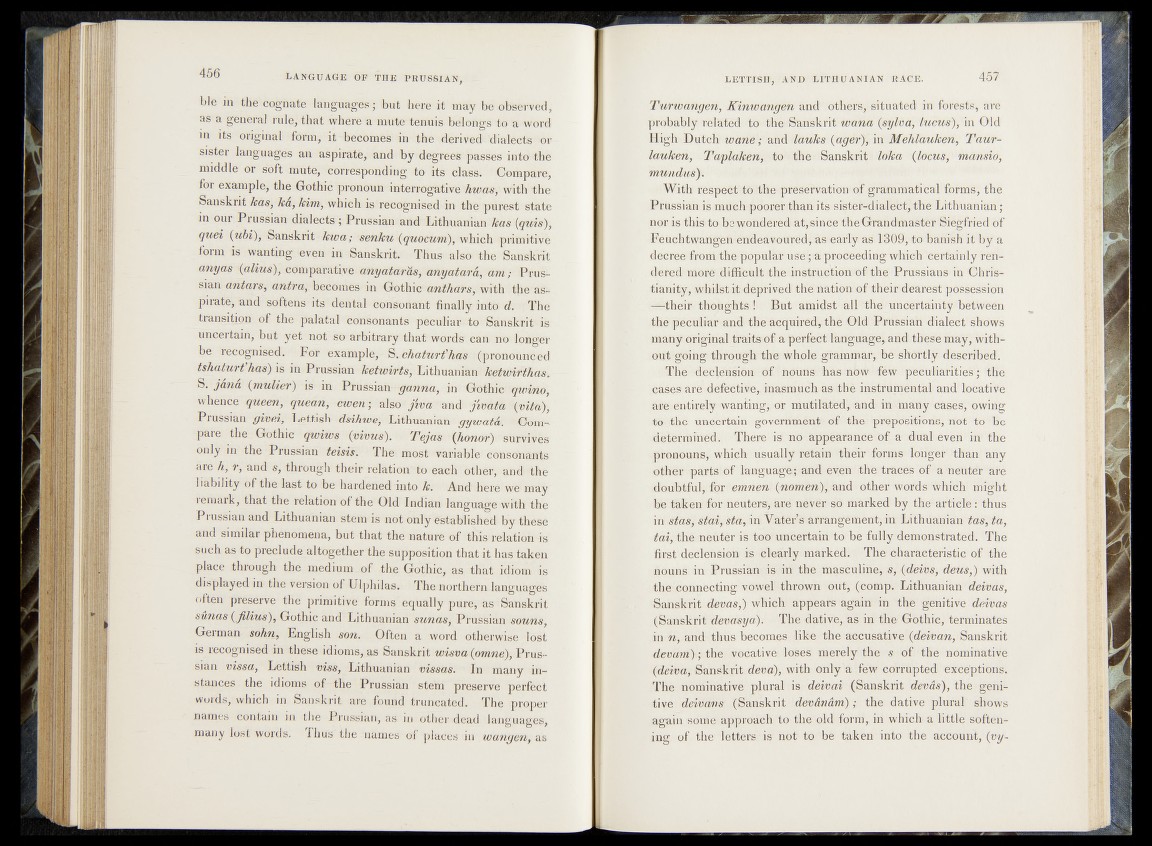
ble in the cognate languages * but here it may be observed,
as a general rule, that where a mute tenuis b e lo r ip to a word
in its original form, it becomes in the derivedv dialects ;or
sister languages an aspirate, and by degrees passes into the
middle or soft mute, corresponding to its class. Compare,
for example, the Gothic pronoun interrogative kwas, with th e
Sanskrit kas, kd, Mm, which is recogni seddn the purest state
in our Prussian dialects; Prussian and Lithuanian kas [quis),
quei (w6i), Sanskrit Jcwa; senku {quocum), which primitive
form is wanting/even in Sanskrit. Thus? also'!th e Sanskrit
anyas {alius), comparative, anyataras, anyatard, dm ; Pw ii
sian antars, antra, becomes in Gothic anihars, with the'hf*
pirate, and softens its dental consoriant finally into d. The
transition of the palatal consonants peculiar- to Sanskrit is
uncertain, but yet not so arbitrary that word's can no longer
be recognised. For example,- &.chaturt'has (pronoanWd
tshdturt has) is in Prussian ketwirts, Lithuanian ketwirthas.
S. jana {mulier) is in PrUssiahH^sanwa, in Gofhier«§tc#©,
whenee queen, quean, ewen« ’also jiv a and
Prussian givei, Lettish dsihwe, Lithuanian gywata. *Gom-
Pare the Gothic qwiws {vivus). Tejas {honor)'^survives
only in the Prussian terns. The* most variablesdmsdffiafer
are h, r, and s, through their relation'to each^SS^fjJiiijrfl^^^
liability of the last to be hardened into k. And' hfei;^weimay
remark, that the relation of the Old Indian language with the
Prussian and Lithuanian stem is not only established by these
and similar phenomena, but that the nature ’©f this relation is
such as to preclude altogether the supposition that it has taken
place through the medium ,o f the Gothic, as that idiom i;s
displayed in the version of Ulphilas. The northern-languages
often preserve the primitive forms equally pure; as Sanskrit
s&nas {films), Gothic and Lithuanian sunas, Prussian sowwa,
German- sohn, English son. Often a word otherwise lost
is recognised in these idioms, j s Sanskrit wisua {omne% Prussian
vissa, Lettish viss, Lithuanian vissas. In many instances
: the idioms; of- the Prussian stem preserve perfect
words, which in Sanskrit are found truncated. The proper
names contain in the Prussian, as in other dead language?,
many lost words. Thus the names of places in wangen, as
Turwangen, Kinwangen and others, situated’ in forests, are
probably related to t-be^Sanskrit wana (spiva, tucUs), in Old
High Dutch' wane; and jlduks (ager), in Mehlauken, Taur-
lauken, Taplaken, to*> t;he Sanskrit i loka (locus, mansio,
mundus).
With respect'to'jfthe' présefvatidiTiof grêhnfhatëical forms, the
PrussiahismuehtpOorerthan i tsffiïstef-dialbctytóhe Lithuanian;
nor is this»to bawon^lërld» atjteinee'rfte Grandmaster Siegfried of
Feücbtwangen e n d e a e a r l y / S k ' LStfS:f$ö bariish it by a
decree fromthö'popular u'iê; a proceeding which certainly rendered1
more difficultÉ h é iir is tr ó > tio n P r u s s i a n s d h 'Ghris-
tianity, whilst ij? depri vfedMhe* natië®>|èftfheir>dearest possesion
^#fheiu th©jiagla!fes b But - amidst'ia-11 'themhefettaiilty^between
the peculiar arid the acquired/feè Old Prussian dialect shows
many original traitMof a perfect langufeage|.arid these may; with-
outigOing through "the" whole gfekmmar,'
The ^tefe^rision ^öf * n#ubs*%as fpl^Miaritiei^f the
'.cases, aé^éefective, inasmuch as the iristrurtféntal pÉd'ïocative
arè, eritirely^wahim^oT mutiMfndy4|ltL' in marly Oases", owing
to the ririeertain^ goverritalnt:’ oft the.-'Ip’tdpdsitTorif ; no t • to be
délêifjriinedy. There a p p e a r s a ed^hèvefl’ in1 the
pronouns, which usually retain '^ b ^ r’Jform#^MIgepthrinf any
other parts'of lungua^$dnd -e^eri ‘of ^^heütéri’riifi
doubtful, for emnen'. {nomènY, *bnd ■. othef‘wc^ds'whic'h might
be taken Cor neuter's^arë nèvfe'r sö marke’^^f-fihe^tfticle: thus
iri stas, stai, sta, in Vritëris arrangèriientjiin Lithuanian tas, ta,
tai, thé neüfèr is too^uncertainftë^bè fu]ly?demoUS#atctlr Thé
, first declension 'is. clearly'markèdL The charaeteristic'of the
nouns in Prus^iamrisriii the déiès,) with
the connecting vQ-w.ef>.-thrawn out, |comp .'Lithuanian deivras,
Sanskrit devas,) which appears again "in the '^eriiti've deivas
(Sanskrit devasyajjm The dativè, 'as in th e Gothic,terminates
in n, and thus becomes^, life'è the^ac.cusativ e$(deivan,< Sanskrit
dev dm); the ^ V o r i a t i r i i c f e l t y the s «bf 'the-: nominative
{deiva, Sanskrit dev a),- with o n ly 'a 'fe ^ corrupted exceptions.
The nominative plural is deivai (Sanskrit dëvds), "the ^gteiri-
tive deiïidbs- '(Sanskrit devdndm); the dative plural" shows
agairifome approttöh yto tlia'cld form, in which a little softening
of the létters is not to be fdken into ïhe account, (uy